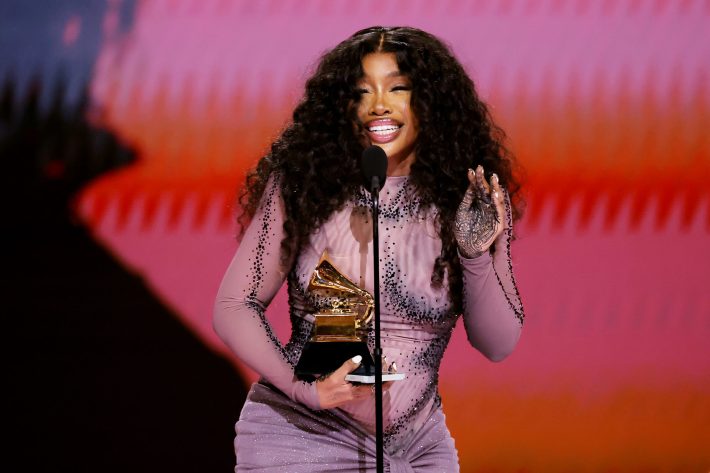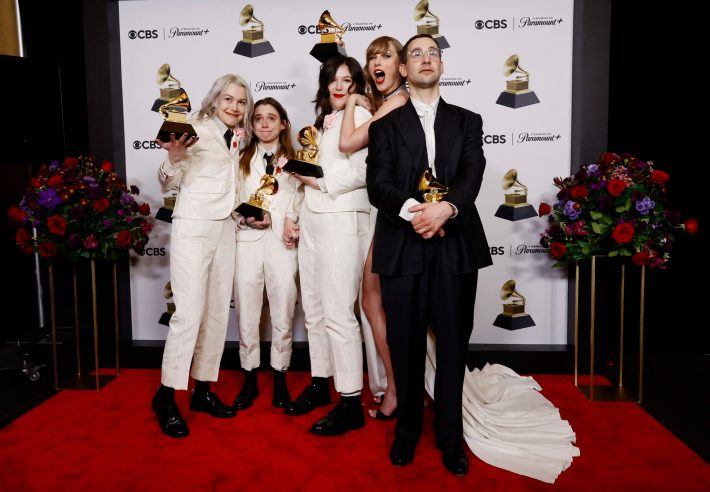Taylor Swift is officially bigger than the Grammys. On the night when she won Album Of The Year for a record fourth time, Swift went out of her way to downplay the significance of the awards she'd just received — though the fact that she won them for Midnights, one of the weakest releases of her career, was already doing plenty to devalue those trophies. (Big wins for "Anti-Hero," the album's deeply memorable, massively successful hit single, would have made a lot more sense.)
About halfway through Sunday night's broadcast from the venerable Crypto.com Arena in Los Angeles, Swift turned her win for Best Pop Vocal Album into an inside joke, assuming — rightfully, I'd guess — that most people watching were aware of her fixation on the number 13. "This is my 13th Grammy, which is my lucky number," she said from the podium. "I don’t know if I’ve ever told you that." I can't get over that phrasing: "I don't know if I've ever told you that." The intimate, personal tone. The casual reference to her own personal mythology. It was as if she was speaking from the stage at the Eras Tour or in a video on her TikTok account, as if she understood that everyone watching was her follower whether they wanted to be or not.
Next, Swift retconned Best Pop Vocal Album into a fan-voted award, implying, more or less, that the Swifties willed this win into existence. "I want to say thank you to the members of the Recording Academy for voting this way," she said, "but I know that the way that the Recording Academy voted is a direct reflection of the passion of the fans. So I want to say thank you to the fans by telling you a secret that I've been keeping from you for the past two years."
Taylor Swift wins her 13th Grammy Award for Best Pop Vocal Album at the 16th Annual #Grammys pic.twitter.com/u2tHGRLn0w
— The Hollywood Reporter (@THR) February 5, 2024
She then hijacked her own acceptance speech to announce the follow-up to Midnights, coming April 19. "It's called The Tortured Poets Department," she said through laughter, presumably understanding that any second now some internet sleuth would connect the title to her ex-boyfriend's "Tortured Man Club" group chat and get the new project's shadow narrative up and running. Imagine basing the launch for your new LP around the absolute certainty that you will be onstage to accept a Grammy. Swift spared not a word for the album she released in October 2022, the one that got her that 13th gramophone. It was full speed ahead toward the next era.
Except, oops, Midnights won Album Of The Year too, which brought Swift back on stage to more explicitly shrug at the idea of piling up these hunks of metal. After devoting a good chunk of her speech to praising Lana Del Rey, who was part of the entourage she brought onstage to celebrate, Swift went right back to minimizing the importance of Grammy wins. "I would love to tell you that this is the best moment of my life, but I feel this happy when I finish a song, or when I crack the code to a bridge that I love, or when I'm shot-listing a music video, or when I'm rehearsing with my dancers, or my band, or getting ready to go to Tokyo to play a show," Swift said. "For me, the award is the work."
(WATCH) Taylor Swift wins Album of the Year #GRAMMYs pic.twitter.com/4BEtTMs3ss
— Deadline (@DEADLINE) February 5, 2024
Remember the infamous Surprised Taylor Swift Face? The one so ubiquitous that it became a meme as she piled up win after win at these kinds of ceremonies? That expression barely flickered to life Sunday night. Swift isn't pretending to be shocked anymore, or really to care at all. Frankly, she shouldn't care very much about winning Grammys — not because she's been there, done that, but because the Grammys continue to be an absurd operation. And that's without getting into the toxic underbelly of an organization where covering up sexual misconduct is reportedly common practice.
There were moments Sunday night that really did reflect the power and glory of popular music at its best. Olivia Rodrigo, covered in blood, bringing campy pageantry to "Vampire." Billie Eilish, seated and scarved, summoning a spellbinding performance of "What Was I Made For?" Tracy Chapman, tears in her eyes, singing her own brilliant "Fast Car" for the first time in 15 years alongside Luke Combs, whose cover became one of the biggest hits in recent memory. An 80-year-old Joni Mitchell perched on a throne, surrounded by adoring disciples, injecting "Both Sides Now" with decades of unimaginable pathos. Any show where Fantasia Barrino does justice to Tina Turner and Annie Lennox bellows an impassioned tribute to Sinead O'Connor can't be all bad.

Some of the acceptance speeches crackled, too. A blubbering SZA declaring "I'm not an attractive crier" while receiving Best R&B Song for "Snooze." A vibrant, awestruck Victoria Monét basking in the glow of her Best New Artist win — at age 34, after years of grinding behind the scenes — and responding to being played off by announcing, "We got the music. Let me just make a song!" It was easy to smile when a blown-out, glammed-up Miley Cyrus turned her performance of "Flowers" into a dance-party victory lap a few minutes after winning Best Pop Solo Performance, her first Grammy.
Victoria Monét wins the award Best New Artist at the 2024 #Grammys pic.twitter.com/2TNbTnj2iu
— The Hollywood Reporter (@THR) February 5, 2024
I'm happy for Cyrus, but the fact that "Flowers" won anything — let alone Record Of The Year, the award given to the year's greatest single — was cause for less pleasant facial expressions. That song stinks. It's the blandest kind of catchy. The empowerment narrative is all well and good, but musically? Sonically? It's the milquetoast Grammy aesthetic boiled down to three minutes, 21 seconds. The best I can say for "Flowers" is that it contributed to a year when women won all four of the general field categories for just the seventh time ever, six years after former Recording Academy president Neil Portnow — one of multiple former Grammy chiefs recently sued for sexual assault — explained a male-slanted gender imbalance by asserting that women needed to "step up."

If we're supposed to be impressed at Music's Biggest Night becoming Women's Biggest Night, Phoebe Bridgers sure wasn't. Hours after winning three Grammys with boygenius and a fourth for her guest spot on SZA's "Ghost In The Machine" at the Premiere Ceremony, Bridgers told Rolling Stone, "The ex-president of the Recording Academy, Neil Portnow, said that if women want to be nominated and win Grammys that they should ‘step up.’ He’s also been accused of sexual violence. To him I’d like to say: I know you’re not dead yet, but when you are, rot in piss."
https://twitter.com/NotoriousVOG/status/1754353308234326169
Who among us did not wince at the dissonance a few times? Sometimes the cringe was mild, as when host Trevor Noah turned a segment with Ziggy Marley and actor Kingsley Ben-Adir, star of the new Bob Marley biopic, into a gag about Jamaican accents. Sometimes it was overwhelming, as when current Grammy prez Harvey Mason Jr. invoked Hamas' deadly attack on an Israeli music festival but studiously avoided saying anything negative about Israel's offensive in Palestine. It was already uncomfortable that the Grammys named a humanitarian award after Dr. Dre before Jay-Z, while receiving said award, called out the Grammys for never giving Album Of The Year to Beyoncé.

Oh yes, that old song. Did anyone really believe SZA, the night's most nominated performer, would win Album Of The Year? Year after year, the Grammys telegraph a triumph for deserving Black artists like Beyoncé and Kendrick Lamar, then pivot to middling work by Beck or Adele or Harry Styles, like Lucy pulling away the football from Charlie Brown at the last second. It's a pattern that has pushed away superstars like the Weeknd, who'd rather maintain their dignity than participate in a rigged game. In predicting the night's Big Four categories, I joked that boygenius would win Album Of The Year because the Recording Academy would not pass up the chance to award three white ladies simultaneously. Maybe that's not exactly what happened, but with the night's three biggest honors distributed between Eilish, Cyrus, and Swift, the sentiment felt more or less the same. Collectively, those wins spoke volumes on a night when both SZA and Monét were set up for imperial dominance but had to settle for pretty good.
VÍDEO: Billie Eilish vence Song of the Year por “What Was I Made For?” no #GRAMMYs pic.twitter.com/HtjxHoP6vR
— BCharts (@bchartsnet) February 5, 2024
The academy's love for Eilish feels extreme — nine Grammys by age 22 — but at least the achingly gorgeous "What Was I Made For?" is a worthy Song Of The Year. I've already grumbled enough about "Flowers." As for Album Of The Year going to Midnights — a project marked by awkward wordplay and undercooked electronic beats from a songwriter who has far more impressive albums to her name — it feels less like a recognition of the year's best LP and more like a chance for the Recording Academy to benefit from Swift's presence, just like the local economies she juices at each tour stop. She's basically a sovereign nation-state unto herself. At this point, the Grammys need her way more than she needs the Grammys.

We rely on reader subscriptions to deliver articles like the one you're reading. Become a member and help support independent media!






